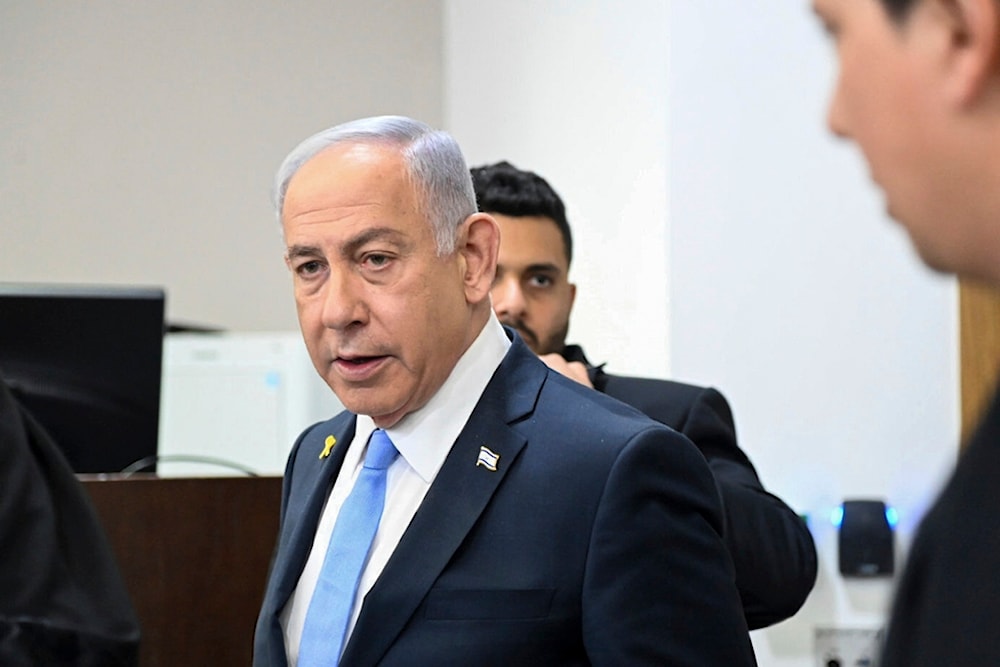Ex-negotiator says 'Israel' did not try for swift return of captives
A negotiator on the Israeli occupation's team underlines that his government did not do everything in its power to bring back the Israeli captives in the Gaza Strip.
-

Israeli Prime Minister Benjamin Netanyahu attends his trial on corruption charges at the district court in Tel Aviv, occupied Palestine, Wednesday, Feb. 12, 2025 (AP)
A former Israeli negotiator has stated that the Israeli regime missed two opportunities last year to secure a ceasefire in Gaza and expedite the release of the captives, drawing a swift denial from Prime Minister Benjamin Netanyahu's office on Saturday.
"In my view, we missed two opportunities to sign an agreement... in March and July" of last year, said Oren Setter, who resigned from the Israeli negotiating team in October. His remarks were broadcast on the occupation's Channel 12 on Saturday.
"We did not do everything we could to bring [the captives] back as quickly as possible," he added.
Netanyahu has faced criticism from opposition figures and some families of hostages, who accuse him of not doing enough to secure their release and of obstructing US-, Qatari-, and Egyptian-mediated negotiations for political reasons.
His office, however, dismissed Setter's remarks, calling them "entirely baseless."
"Had the prime minister not stood firm, at least half of the living hostages would not have been freed in the first phase," of the current truce, Netanyahu's office said in a statement.
The statement also blamed Hamas for the delays, claiming that "as repeatedly testified by senior US officials, Hamas refused to engage in negotiations for months and was the sole obstacle to a deal."
"Prime Minister Netanyahu's steadfast stance, along with President [Donald] Trump's threats, led to Hamas's capitulation, the release of our hostages, and the safeguarding of Israel's security interests," it added.
Setter, meanwhile, stressed the need to "speak about facts" and argued that hostage deaths in captivity and "unnecessary suffering" could have been avoided.
Hamas was ready for a ceasefire
Despite the Israeli claims, Hamas signaled a mere 3 weeks after October 7 that it was ready to return the captives to "Israel". Hamas' then-leader in the Gaza Strip martyr Yahya Sinwar said on October 28 that the Resistance movement was prepared for an "immediate" exchange of prisoners with "Israel", however, he stressed that it should be under the formula of all for all.
"We are ready to conduct an immediate prisoner exchange deal that includes the release of all Palestinian prisoners from Israeli jails in exchange for all prisoners held by the Palestinian Resistance," al-Sinwar said in a statement.
This came shortly after the military spokesperson for Hamas' al-Qassam Brigades, Abu Obeida, disclosed that the Israeli occupation entity has delayed negotiations regarding the release of Palestinian prisoners, noting that over 50 captives had been killed due to Israeli strikes.
Derailing ceasefire?
Similarly, a Hamas official told Al Mayadeen on Monday that it believes "Israel" was actively working to derail the ceasefire agreement.
The official stated that Israeli statements regarding the second phase of the deal signal an unwillingness to commit to a lasting ceasefire.
Moreover, Hamas, as per the official, sees "Israel" as relying heavily on US President Donald Trump's reckless decisions to justify its policies and actions in the next phase.
Hamas says that if "Israel" does not adhere to the second phase of the agreement, it will pay a heavy price, the Palestinian official underscored.
Israeli media on Sunday suggested that Prime Minister Benjamin Netanyahu is deliberately obstructing the ongoing ceasefire negotiations with Hamas, aiming to derail the agreement before its next phase.
Reports suggest that the Israeli delegation sent to Qatar lacks real authority, signaling Netanyahu's unwillingness to move forward with a deal that would secure the release of more Palestinian detainees and a permanent ceasefire in Gaza.

 4 Min Read
4 Min Read










